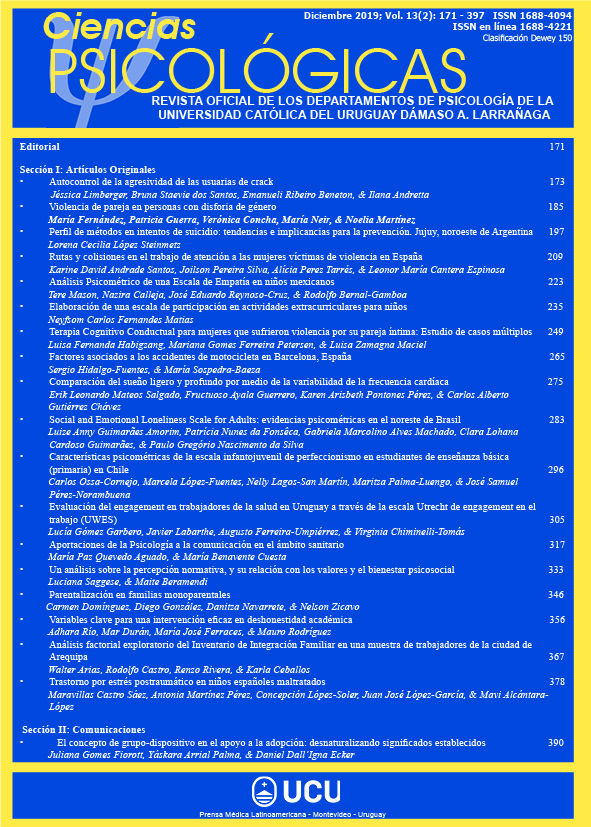An analysis of normative perception, and its relation to values and psychosocial well-being
DOI:
https://doi.org/10.22235/cp.v13i2.1890Keywords:
norms, transgression, values, well-being, workersAbstract
Several authors agree that transgression in Argentina is a common practice rooted and naturalized. , It arises a model which analyzes the perception of the legal system as a complex organism comprising not only the norms themselves, but the institutions and actors involved in it. The objective of the present study is to analyze, from a psychosocial perspective, the relationship between the perception of the normative system, the well-being and the values of workers of the City of Buenos Aires and the Conurbano Bonaerense. A non-experimental, descriptive-correlational study was designed. The sample is intentional, composed of 148 workers. Descriptive analyzes indicate a poor perception of the normative system, values associated with health, survival and personal stability prevail, and a high level of psychosocial well-being. As a novel finding, relations between the negative perception of the normative system and the rest of the variable were not found.
Downloads
References
Beramendi, M., Acosta, Y., & Zubieta, E. (2016). Polarización sociopolítica y percepción del sistema normativo en Venezuela. Psychologia: Avances de la Disciplina, 10(1), 35-45. doi: 10.21500/19002386.2464.
Beramendi, M., Espinosa, A. & Acosta, Y.(2019). Percepción del Sistema Normativo y sus correlatos psicosociales en Argentina, Perú y Venezuela. Manuscrito enviado para su publicación.
Beramendi, M. & Zubieta, E. (2013). La identidad nacional y las relaciones sociales en una cultura de la transgresión. Revista de Psicología Política, 13(26), 165-177.
Beramendi, M. & Zubieta, E. M. (2014). Norma Perversa: transgresión como modelado de legitimidad. Universitas Psychologica, 12(2). doi:10.11144/javeriana.upsy12-2.nptm
Beramendi, M. & Zubieta, E. M. (2015). Un estudio exploratorio sobre la relación entre la legitimidad institucional y la transgresión normativa en Argentina. Ciencias Psicológicas, 9, 15 – 26. Montevideo.
Beramendi, M. & Zubieta, E. (2016). Análisis de la percepción del sistema normativo y sus repercusiones psicosociales en los futuros oficiales del Ejército Argentino. Revista Electrónica de Psicología Política, 12(37), 125-139.
Beramendi, M. & Zubieta, E. (2018). The factorial validation of the normative system perception scale: a proposal to analyze social transgression. Acta Colombiana en Psicología. 21(1), 249-259. doi: 10.14718/acp.2018.21.1.11.
Blanco, A. & Díaz, D. (2005). El bienestar social: su concepto y medición. Psicothema, 17(4), 582-589.
Cialdini, R. B. (2007). Descriptive Social Norms as Underappreciated Sources of Social Control. Psychometrika, 72(2), 263–268. doi:10.1007/s11336-006-1560-6.
Diener, E., Suh, E. M., Lucas, R. E. & Smith, H. L. (1999). Subjective well-being. Three decades of progress. Psychological Bulletin. 125(2), 276 – 302.
Gouveia, V. V., Milfont, T. L., Fischer, R., & Coelho, J. A. P. (2009). Teoria funcionalista dos valores humanos: aplicações para organizações. RAM. Revista de Administração Mackenzie, 10(3), 34–59. doi:10.1590/s1678-69712009000300004.
Gouveia, V. V., Milfont, T. L., Fischer, R., & Santos, W. S. (2008). Teoria funcionalista dos valores humanos. In M. L. M. Teixeira (Ed.), Valores humanos e gestão: Novas perspectivas (pp. 47-80). São Paulo, SP: Serviço Nacional de Aprendizagem Comercial.
Gouveia, V. V., Milfont, T. L., & Guerra, V. M. (2014). Functional theory of human values: Testing its content and structure hypotheses. Personality and Individual Differences, 60, 41–47. doi:10.1016/j.paid.2013.12.012.
Gouveia, V. V., Santos, W. S. dos, Athayde, R. A. A., Souza, R. V. L. & Gusmão, E. É. da S. (2014). Valores, Altruísmo e Comportamentos de Ajuda: Comparando Doadores e Não Doadores de Sangue. Psico, 45(2), 209-218. doi:10.15448/1980-8623.2014.2.13837.
Gouveia, V., Milfont, T. L., Correa Vione, K. & Santos, W. S. (2015). Guiding Actions and Expressing Needs: On the Psychological Functions of Values. Psykhe (Santiago), 24(2), 1–14. doi:10.7764/psykhe.24.2.884.
Hervás, G., & Vázquez, C. (2013). Construction and validation of a measure of integrative well-being in seven languages: The Pemberton Happiness Index. Health and Quality of Life Outcomes, 11(1), 66. doi:10.1186/1477-7525-11-66.
Inglehart, R. (1977). The silent revolution: changing values and political styles among western publics. Nueva Jersey: Princenton University Press,
Keyes, C. L. M. (1998). Social Well-Being. Social Psychology Quarterly, 61(2), 121-140. doi:10.2307/2787065.
Monsegur, S., Espinosa, A., & Beramendi, M. (2014). Identidad nacional y su relación con la dominancia social y la tolerancia a la transgresión en residentes de Buenos Aires (Argentina). Interdisciplinaria: Revista de Psicología y Ciencias Afines, 31(1), 5-23. doi:10.16888/interd.2014.31.1.1.
Nino, C. (2005). Un país al margen de la ley. Buenos Aires: Ariel.
Rokeach, M.(1973). The nature of human values. NewYork: Free Press.
Rodríguez-Carvajal, R.; Díaz, D.; Moreno-Jiménez, B.; Blanco, A. & van Dierendock, D. (2010). Vitalidad y recursos internos como componentes del constructo de bienestar psicológico. Psicothema, 22(1), 63-70.Ryan, R. M., Huta, V., & Deci, E. L. (2006). Living well: a self-determination theory perspective on eudaimonia. Journal of Happiness Studies, 9(1), 139–170. doi:10.1007/s10902-006-9023-4.
Ryan, R. M., & Deci, E. L. (2001). On Happiness and Human Potentials: A Review of Research on Hedonic and Eudaimonic Well-Being. Annual Review of Psychology, 52(1), 141–166. doi:10.1146/annurev.psych.52.1.141.
Ryff, C. D., & Keyes, C. L. M. (1995). The structure of psychological well-being revisited. Journal of Personality and Social Psychology, 69(4), 719–727. doi:10.1037/0022-3514.69.4.719.
Sanchis, E. (1988). Valores y actitudes de los jóvenes ante el trabajo. Reis, 41, 131-151. doi:10.2307/40183314.
Schwartz, S. H. (1977). Normative influence on altruism. En L. Berkowitz (Ed.), Advances in experimental social psychology (pp. 221-279). New York: Academic Press.
Schwartz, S. H. (2012). An Overview of the Schwartz Theory of Basic Values. Online Readings in Psychology and Culture, 2(1), 1-20. doi: 10.9707/2307-0919.1116.
Valle, M., Beramendi, M. & Delfino, G. (2011). Bienestar Psicológico y Social en jóvenes universitarios argentinos. REVISTA DE PSICOLOGÍA, 7(14), 7-26.
Zubieta, E., Muratori , M., & Fernández , O. (2012). Bienestar subjetivo y psicosocial: explorando diferencias de género. Salud & Sociedad, 3(1), 66–76. doi:10.22199/s07187475.2012.0001.00005.
















